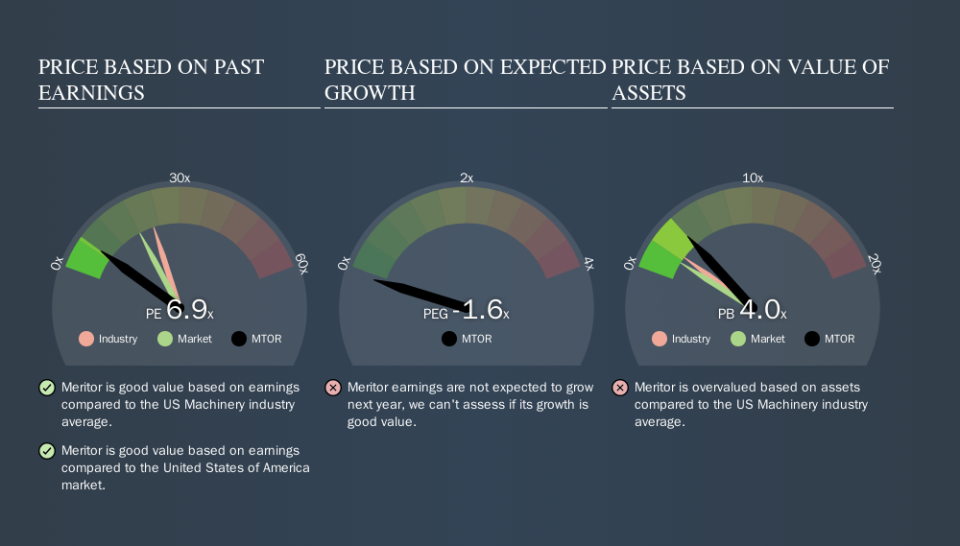How Does Meritor's (NYSE:MTOR) P/E Compare To Its Industry, After Its Big Share Price Gain?

Meritor (NYSE:MTOR) shares have had a really impressive month, gaining 31%, after some slippage. And the full year gain of 35% isn't too shabby, either!
All else being equal, a sharp share price increase should make a stock less attractive to potential investors. While the market sentiment towards a stock is very changeable, in the long run, the share price will tend to move in the same direction as earnings per share. So some would prefer to hold off buying when there is a lot of optimism towards a stock. One way to gauge market expectations of a stock is to look at its Price to Earnings Ratio (PE Ratio). A high P/E ratio means that investors have a high expectation about future growth, while a low P/E ratio means they have low expectations about future growth.
See our latest analysis for Meritor
How Does Meritor's P/E Ratio Compare To Its Peers?
We can tell from its P/E ratio of 6.86 that sentiment around Meritor isn't particularly high. We can see in the image below that the average P/E (22.4) for companies in the machinery industry is higher than Meritor's P/E.
Meritor's P/E tells us that market participants think it will not fare as well as its peers in the same industry. Many investors like to buy stocks when the market is pessimistic about their prospects. It is arguably worth checking if insiders are buying shares, because that might imply they believe the stock is undervalued.
How Growth Rates Impact P/E Ratios
P/E ratios primarily reflect market expectations around earnings growth rates. Earnings growth means that in the future the 'E' will be higher. That means even if the current P/E is high, it will reduce over time if the share price stays flat. A lower P/E should indicate the stock is cheap relative to others -- and that may attract buyers.
Meritor saw earnings per share decrease by 10% last year. But over the longer term (5 years) earnings per share have increased by 2.1%.
Remember: P/E Ratios Don't Consider The Balance Sheet
One drawback of using a P/E ratio is that it considers market capitalization, but not the balance sheet. Thus, the metric does not reflect cash or debt held by the company. Theoretically, a business can improve its earnings (and produce a lower P/E in the future) by investing in growth. That means taking on debt (or spending its cash).
While growth expenditure doesn't always pay off, the point is that it is a good option to have; but one that the P/E ratio ignores.
So What Does Meritor's Balance Sheet Tell Us?
Net debt is 34% of Meritor's market cap. While that's enough to warrant consideration, it doesn't really concern us.
The Bottom Line On Meritor's P/E Ratio
Meritor trades on a P/E ratio of 6.9, which is below the US market average of 18.1. With only modest debt, it's likely the lack of EPS growth at least partially explains the pessimism implied by the P/E ratio. What we know for sure is that investors are becoming less uncomfortable about Meritor's prospects, since they have pushed its P/E ratio from 5.2 to 6.9 over the last month. If you like to buy stocks that could be turnaround opportunities, then this one might be a candidate; but if you're more sensitive to price, then you may feel the opportunity has passed.
When the market is wrong about a stock, it gives savvy investors an opportunity. As value investor Benjamin Graham famously said, 'In the short run, the market is a voting machine but in the long run, it is a weighing machine. So this free visualization of the analyst consensus on future earnings could help you make the right decision about whether to buy, sell, or hold.
You might be able to find a better buy than Meritor. If you want a selection of possible winners, check out this free list of interesting companies that trade on a P/E below 20 (but have proven they can grow earnings).
We aim to bring you long-term focused research analysis driven by fundamental data. Note that our analysis may not factor in the latest price-sensitive company announcements or qualitative material.
If you spot an error that warrants correction, please contact the editor at editorial-team@simplywallst.com. This article by Simply Wall St is general in nature. It does not constitute a recommendation to buy or sell any stock, and does not take account of your objectives, or your financial situation. Simply Wall St has no position in the stocks mentioned. Thank you for reading.

 Yahoo Finance
Yahoo Finance 
